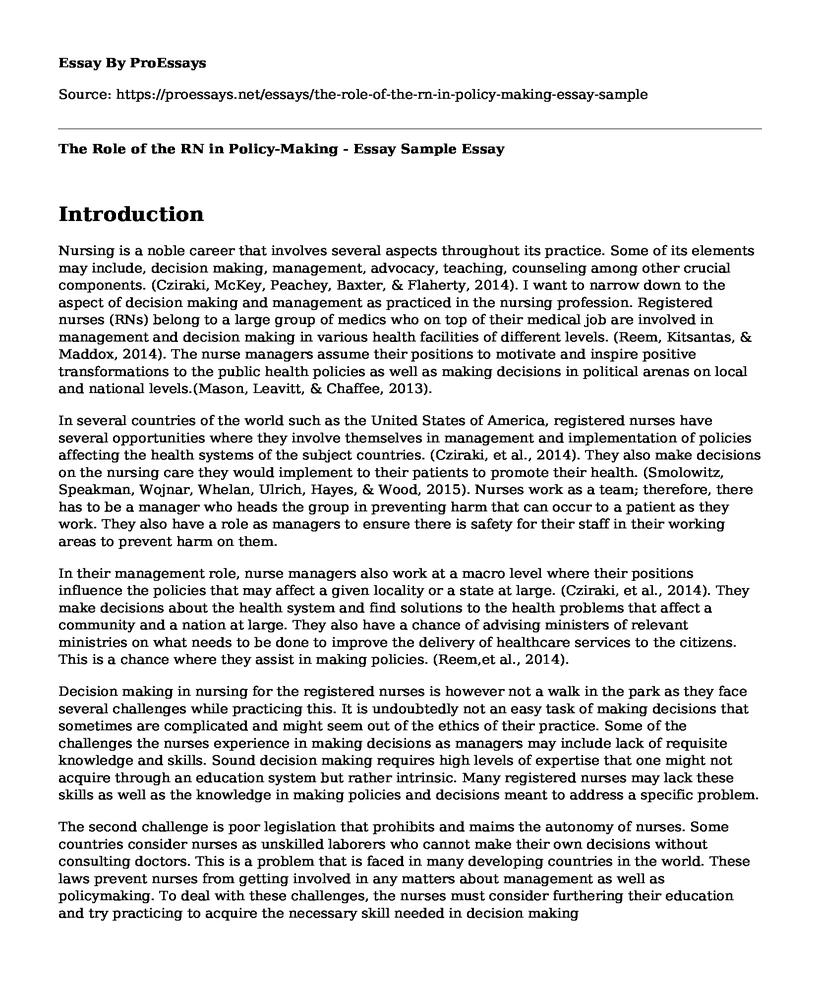Introduction
Nursing is a noble career that involves several aspects throughout its practice. Some of its elements may include, decision making, management, advocacy, teaching, counseling among other crucial components. (Cziraki, McKey, Peachey, Baxter, & Flaherty, 2014). I want to narrow down to the aspect of decision making and management as practiced in the nursing profession. Registered nurses (RNs) belong to a large group of medics who on top of their medical job are involved in management and decision making in various health facilities of different levels. (Reem, Kitsantas, & Maddox, 2014). The nurse managers assume their positions to motivate and inspire positive transformations to the public health policies as well as making decisions in political arenas on local and national levels.(Mason, Leavitt, & Chaffee, 2013).
In several countries of the world such as the United States of America, registered nurses have several opportunities where they involve themselves in management and implementation of policies affecting the health systems of the subject countries. (Cziraki, et al., 2014). They also make decisions on the nursing care they would implement to their patients to promote their health. (Smolowitz, Speakman, Wojnar, Whelan, Ulrich, Hayes, & Wood, 2015). Nurses work as a team; therefore, there has to be a manager who heads the group in preventing harm that can occur to a patient as they work. They also have a role as managers to ensure there is safety for their staff in their working areas to prevent harm on them.
In their management role, nurse managers also work at a macro level where their positions influence the policies that may affect a given locality or a state at large. (Cziraki, et al., 2014). They make decisions about the health system and find solutions to the health problems that affect a community and a nation at large. They also have a chance of advising ministers of relevant ministries on what needs to be done to improve the delivery of healthcare services to the citizens. This is a chance where they assist in making policies. (Reem,et al., 2014).
Decision making in nursing for the registered nurses is however not a walk in the park as they face several challenges while practicing this. It is undoubtedly not an easy task of making decisions that sometimes are complicated and might seem out of the ethics of their practice. Some of the challenges the nurses experience in making decisions as managers may include lack of requisite knowledge and skills. Sound decision making requires high levels of expertise that one might not acquire through an education system but rather intrinsic. Many registered nurses may lack these skills as well as the knowledge in making policies and decisions meant to address a specific problem.
The second challenge is poor legislation that prohibits and maims the autonomy of nurses. Some countries consider nurses as unskilled laborers who cannot make their own decisions without consulting doctors. This is a problem that is faced in many developing countries in the world. These laws prevent nurses from getting involved in any matters about management as well as policymaking. To deal with these challenges, the nurses must consider furthering their education and try practicing to acquire the necessary skill needed in decision making
Conclusion
To better their advocacy and communication skills, the nurses should consider holding and attending seminars that will train them on qualities of a good advocate. A workshop like this offers a chance for the nurses to develop skill on advocacy, and communication which is vitakeyl in the development of decision-making skills. (Cole, Wellard, & Mummery, 2014). Additionally forming trade unions and other bodies that will help them to speak in one voice is a critical idea which would ensure proper legislation that allows for the autonomy of the registered nurses in the countries that do not allow them to practice autonomously. Bodies like the International Council of nurses which allows the nurses in the world to speak in one voice as well as fight for the autonomy of the nursing as an independent profession.
References
Cole, C., Wellard, S., & Mummery, J. (2014). Problematising autonomy and advocacy in nursing. Nursing ethics, 21(5), 576-582.
Cziraki, K., McKey, C., Peachey, G., Baxter, P., & Flaherty, B. (2014). Factors that facilitate Registered Nurses in their firstline nurse manager role. Journal of nursing management, 22(8), 1005-1014.
Mason, D. J., Leavitt, J. K., & Chaffee, M. W. (2013). Policy and Politics in Nursing and Healthcare-Revised Reprint. Elsevier Health Sciences.
Reem, A. D., Kitsantas, P., & Maddox, P. J. (2014). The impact of residency programs on new nurse graduates' clinical decision-making and leadership skills: A systematic review. Nurse Education Today, 34(6), 1024-1028.
Smolowitz, J., Speakman, E., Wojnar, D., Whelan, E. M., Ulrich, S., Hayes, C., & Wood, L. (2015). Role of the registered nurse in primary health care: Meeting health care needs in the 21st century. Nursing Outlook, 63(2), 130-136.
Cite this page
The Role of the RN in Policy-Making - Essay Sample. (2022, Dec 19). Retrieved from https://proessays.net/essays/the-role-of-the-rn-in-policy-making-essay-sample
If you are the original author of this essay and no longer wish to have it published on the ProEssays website, please click below to request its removal:
- Time Management Tips for Learners
- Information Security Management Paper Example
- Misuse of Opioid-Mediated Placebo in Sports - Essay Sample
- The Role of the RN in Policy-Making - Essay Sample
- Essay Sample on Lead Poisoning Risks in Children: Know the Signs
- Essay Example on Ethical Principles: Business Operations in a Changing Society
- Essay Example on Essential Life Knowledge: Don't Neglect or Risk Dire Consequences







